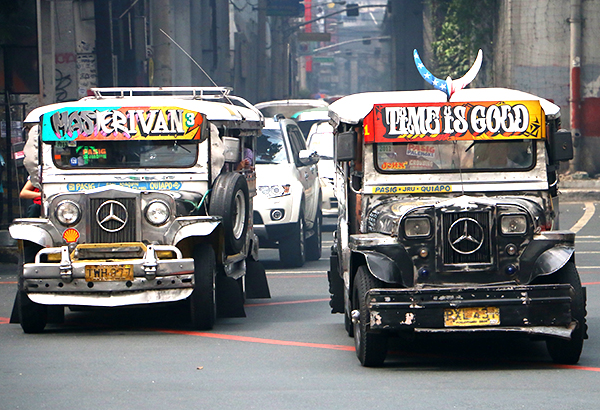‘Jeepney modernization program not anti-poor’

Under the program, jeepneys that are 15 years and older will be replaced by electric-powered or Euro 4 compliant vehicles. File
MANILA, Philippines — The modernization program for public utility vehicles, which starts next week, is not anti-poor as it guarantees profitability for the jeepney industry, Malacañang said yesterday.
“The Palace clarifies that the public utility vehicle modernization program of the Duterte administration is not anti-poor, contrary to the claims of some transport groups,” presidential spokesman Harry Roque said in a statement.
“We assure Filipino jeepney drivers that this initiative of the government to improve our public transport sector will not put them out of business,” Roque said.
“It was not designed to phase out jeepneys. In fact, the program aims to strengthen and guarantee the profitability of the jeepney business,” he added.
Under the program, jeepneys that are 15 years and older will be replaced by electric-powered or Euro 4 compliant vehicles.
The three-year phase out of old and dilapidated jeepneys will start next week, according to the transportation department.
A motor vehicle inspection system will be activated to determine the age and roadworthiness of jeepneys.
Officials said the program would improve the country’s transport system as well as reduce harmful emissions.
Transport groups Stop and Go Coalition and the Pinagkaisang Samahan ng Tsuper at Operator Nationwide are opposed to the total phase out of old jeepneys, saying it would pose additional burden to drivers and operators.
Roque said the government is addressing the concerns of transport workers by offering financing schemes that will allow them to buy new jeepney units.
These include the Development Bank of the Philippines’ Support Alternative Driving Approaches (Pasada) program and the Landbank of the Philippines’ Special Environment-Friendly and Efficiently Driven Jeepney Program.
He said the finance department is offering a five percent equity, six percent interest rate and a repayment period of as long as seven years on top of the P80,000 subsidy per unit to cover the equity payment.
“In addition, there is zero or low maintenance cost of new units in the first three years, which translates to savings,” Roque said.
President Duterte has vowed to implement the transport modernization program in the first week of the coming year, even threatening to tow non-compliant vehicles.
Take it easy
But Sen. Grace Poe said the Department of Transportation (DOTr) should go slow on imposing the jeepney phase out as there might not be enough replacements yet for those that would be taken off the road.
Besides, she said, the standards for new units were still being worked out.
Poe, chair of the Senate committee on public services, noted that Transportation Secretary Arthur Tugade himself had admitted at a recent public hearing that a phase out could not be accomplished overnight.
“Secretary Tugade said that for as long as the old jeeps pass the safety and emission standards, they can continue to operate within the three-year period of the phase out. Best to get the comments of Sec. Tugade himself if his pronouncements have changed,” Poe said.
The senator clarified that she is not against the modernization of the jeepneys, which she said “is long overdue.”
“But even if we wanted to implement this immediately, realistically, it cannot be done. DOTr itself does not have its act together when it comes to timetables, regulations and guidelines for the implementation,” Poe said.
According to the DOTr, the government would provide a subsidy of P30,000 for each of the jeepney owners to help finance their purchase of the new vehicles.
An initial P2 billion would be provided in the 2018 General Appropriations Act for this purpose, an amount which Poe noted is not even close to what is actually needed for the rollout of the modernization program.
“Besides, if they will give every jeepney driver 30K, the two billion allocation they have for 2018 is far from the P300 billion it will take to roll out the program,” Poe said.
“They need to coordinate and get their act together. The numbers will speak for itself,” she added.
Poe pointed out that the actual total cost of the program is P417 billion. – Marvin Sy
- Latest
- Trending






























